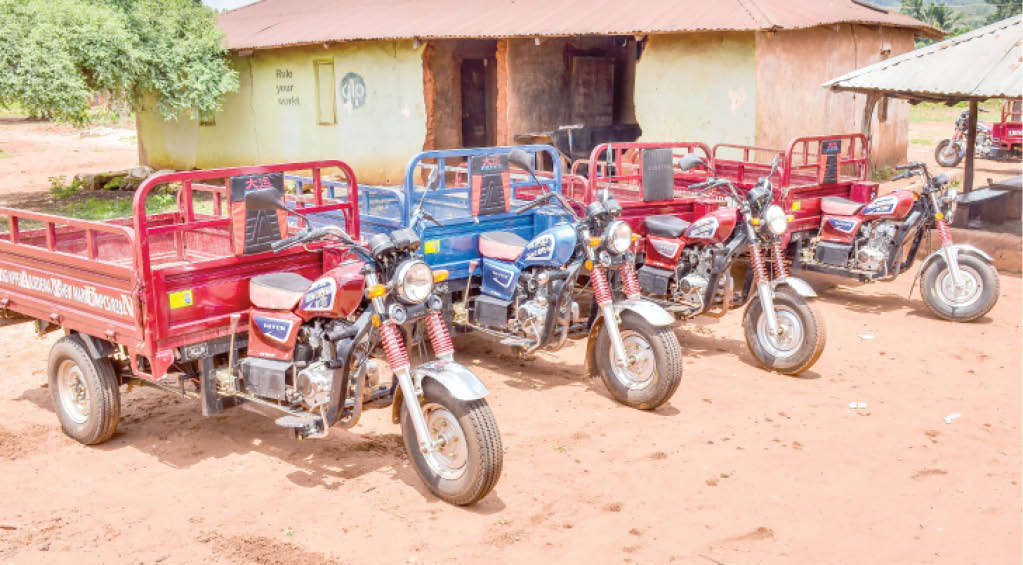The Agro-Processing, Productivity Enhancement and Livelihood Support (APPEALS) Project is jointly supported by the World Bank, the Federal Government of Nigeria and the Kogi State Government.
The objective of the project is to enhance the agricultural productivity of small and medium scale farmers and improve the value addition along priority value chains of rice, cashew and cassava.
The project, which is headed by the coordinator in Kogi State, Dr Sanni Abdullahi Ozomata, took off in October 2018 while full implementation began in January 2019
According to Ozomata, the total hectares the project facilitated support for include rice, 993ha; cashew, 2,501ha and cassava, 1,044ha.
Daily Trust on Sunday toured some of the farms and reports on the impact of the project so far.
Cashew farmers earning big after interventions
The cluster chairman of the Ochaja Cooperative Society in Dekina Local Government Area of Kogi State, Chief Yahaya Musa, said interventions by APPEALS had boosted the productivity of cashew in the area and positively impacted on the livelihood of people of the community.
He said 50 cashew farmers across five clusters, comprising 10 farmers per cluster, were benefitting from the interventions in Ochaja community.
Chief Musa, who owns a 4-hectare cashew plantation in the area, said the coming on board of APPEALS marked a turning point for cashew farmers in Ochaja and other areas where the interventions are ongoing.
He said that prior to the intervention by APPEALS, his cashew plantation had suffered neglect and abandonment for over 10 years as he didn’t have the wherewithal to maintain the farm.
“I ignored my farm because the work became tedious and there were no tools to use in maintaining it. There was no financial support; I just left it bushy, and every year, fire would wreak havoc in the farm.
“But with the facilitation of hand mowers, a place that about five labourers can cover in a day, with just a liter of petrol you would clear the whole place in no time.
“They also facilitated herbicides and insecticides for us. They facilitated manual sprayers and motorised sprayers to use on our farms. You see that every where is looking dried because I used herbicides. Apart from that, they organised seminars for us to have record of our activities.
“They gave us farm record books, through which we can now know whether we gain or lose. Not only that, they facilitated even in the aspect of moving our products from the farm to the market or our various homes or stores.
“They didn’t stop at that. You know that formerly, the middlemen usually came around to buy up our cashew nuts at any price they liked, but Kogi APPEALS facilitated and linked us up with off-takers. They gave us Olam, and we are now getting more than double of what we used to get from our sales.
“Go to our villages now and you will see people erecting modern houses. It is as a result of the intervention of the Kogi APPEALS in cashew productivity. We no longer sell our cashews to local buyers, who always shortchanged us,” he said.
He said the Kogi APPEALS, in collaborations with the Cocoa Research Institute of Nigeria (CRIN), Ibadan, came to demonstrate to them how they could prune their cashew for more yield.
On his part, Noah Yusufu, another cluster chairman in Ochaja, said the interventions by APPEALS had turned cashew farming into a lucrative venture.
He said that before the interventions of APPEALS, he used to harvest only 15 bags from his seven-hectare farm, but now, he harvests 45 bags of cashew nuts. According to him, a bag of cashew nuts currently sells at N40,000.
A woman who is into cashew farming, Egbunu Ukwela, said the interventions had helped in boosting her productivity and positively impacted on her livelihood.

Cassava farmers target N53.7m from 43 hectares
Similarly, the Okehi cluster chairman of cassava value chain, John Omeiza Sariki, said the interventions of the APPEALS Project had boosted cassava production in the area.
According to him, a total of 43 hectares of cassava have been cultivated in the area by 20 farmers across the two clusters benefitting from the interventions.
On the impacts of APPEALS, he said, “They facilitated fertilisers, inputs and chemicals for us. They also facilitated tricycles, cutlasses, wheelbarrows, knapsack sprayers etc. In fact, they trained us in many ways, including record keeping.”
He said that before now, they used to harvest 10 to 12 tonnes per hectare, but with the interventions, they are expecting over 25 to 30 tonnes per hectare.
According to him, a tonne of cassava currently sells at N50,000, which implies that farmers are expecting to rake in over N53.7million from the 43 hectares during harvest later in the year.
Two young rice farmers secure university admission
Rice farmers in Chakuruku community in Kogi Local Government Area said the interventions by APPEALS had been a great blessing to them.
The cluster chairman of Chakuruku, Mohammed Zakaria, said rice productivity and yield in the area had tripled, compared to what they used to harvest.
According to him, 60 farmers across six clusters are currently taking part in the project, under which over 120 hectares of rice are being cultivated.
“We used to cultivate one hectare per person, but when APPEALS came, with their support, each person now has 3 to 4 hectares. They supported us with inputs, chemical and equipment.
“Before now, we harvested 20 bags of paddy rice per hectare, but now, we harvest 50 bags,’’ he said.
Also speaking, an extension officer, Dauda Abdulrahman Musa, attributed the successes recorded by farmers to strict monitoring to ensure adherence to agronomic practices.
The young farmers who secured admissions include Abdullahi Yahaya (Nasarawa State University, Keffi) and Mohammed Zakaria (Ahmadu Bello University, Zaria).
Speaking on the project, the communications officer of the Kogi APPEALS Project, Ocholi Napoleon Ikani, expressed delight with its impact so far.
“Amidst the challenges the Kogi APPEALS Project has encountered, I would not want to sing our praise, but I will give ourselves a pass mark because we came on board in 2018 and began implementation in January 2019,.
“In 2020, we had the coronavirus pandemic which affected everything, but despite that, the project coordinator picked up the courage to still venture into project implementation activities, knowing full well that the aftermath of COVID-19 would mean food shortages. And if we didn’t reach out to farmers we would have food crisis to contend with.
“From the testimonies of farmers you can see the impact the Kogi APPEALS has on them. Aside the challenge of COVID-19, drought and flood disasters also affected the activities of our farmers,” he said.

 Join Daily Trust WhatsApp Community For Quick Access To News and Happenings Around You.
Join Daily Trust WhatsApp Community For Quick Access To News and Happenings Around You.

